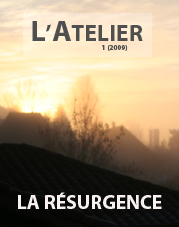Saturday by Ian McEwan or the resurgence of 9/11 in allegorical form
Mots-clés :
McEwan, IanRésumé
In Saturday by Ian McEwan, the author seeks to translate the eventfulness of the 9/11 disaster into an allegory of the safe Western individual whose life is suddenly intruded upon by rogues. Even though the novel does not impose a clear-cut ideological or political position as regards the 9/11 attacks, yet the plot forces the reader to reconsider the event in its social and political implications as it chooses the figure of the allegory to emplot the main protagonist’s own eventful day and its sudden disruption by street mobs. With the enfolding of the story, when the reader expects the plot to take a turn for the worst, an almost miraculous epiphanic scene takes place, where imminent disaster is transmuted into the life-saving happening of a poetic event. Thanks to the alchemical transmutation of a political disaster into a poetic event, the allegory which McEwan’s novel relies on, appears as one of the ways the author comes to terms with the sense of helplessness and impotency which 9/11 has allegedly brought onto a number of English and American fiction writers since 2001.
Publiée
Numéro
Rubrique
Licence
-
L’envoi spontané d’un article à la rédaction de L’Atelier implique l’autorisation de publication et la cession des droits dans les limites établies par la loi de propriété intellectuelle.
-
L’Atelier conserve les droits de reproduction des articles publiés, quelque soit le support : internet, CD ROM, réimpression, photocopie, etc.
-
L’auteur conserve le droit de publier ultérieurement son article déjà paru dans L’Atelier avec la seule obligation de mentionner le nom de la revue comme source de la première publication.


